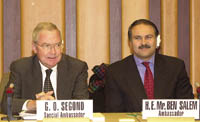| Dear readers,
Welcome to this first issue of 2002.We hope you all had a
happy, peaceful and restful festive season.
As the beginning of the year seems a good time to introduce change,
we are pleased to announce our new column entitled “ITU AT A
GLANCE” to highlight monthly key events at ITU. With so much
happening every month, it is a real challenge to cut through the
information overload. This column is intended to give you an
insightful briefing on current ITU activities with a global or
regional reach. We hope that you will find it an enjoyable read.
The Editor
|
Highlights
December 2001/January 2002
United Nations adopts resolution on the World Summit on the Information
Society. On 21 December 2001, the UN General Assembly adopted a
resolution welcoming the organization of the World Summit on the Information
Society. The resolution (A/RES/56/183) recognizes the leading role of ITU in
organizing the Summit, which is expected to promote access by all countries to
information, knowledge and communication technologies. Further, the resolution
endorses the framework agreed by the ITU Council in June 2001 to hold the Summit
in two phases, the first in Geneva from 10 to 12 December 2003 and the second in
Tunis in 2005. It urges all relevant United Nations bodies and intergovernmental
organizations, including international and regional institutions, as well as
non-governmental organizations, the civil society and the private sector to take
an active part in, and contribute effectively to, the Summit and its
preparations.

It also calls on governments to participate actively in the Summit and to be
represented at the highest possible level. An important experts workshop
(Geneva, 5-6 December 2001) was organized in Geneva by the Federal Office for
Communications (OFCOM), the Swiss telecommunications regulator. An information
session for Ambassadors also took place at ITU headquarters on 24 January 2002.
A series of preparatory meetings will be held during the year, with the first
Preparatory Committee Meeting scheduled to take place in Geneva from 1 to 5 July
2002.
World Telecommunication Development Conference (WTDC-02). The host
country agreement for WTDC-02 was signed at ITU headquarters on 4 December 2001
by Fatih Yurdal, President and Chairman of the Board of the Telecommunication
Authority of Turkey and Yoshio Utsumi, ITU Secretary-General. WTDC-02 will take
place at the Lütfi Kirdar Convention and Exhibition Centre in Istanbul from 18
to 27 March 2002. The real challenge for WTDC-02 will be to show how sector
reform and investment in information and communication technologies can make a
genuine difference to improving the livelihoods of the world’s most deprived
populations. WTDC-02 is expected to adopt a declaration, which enshrines a
shared vision of the future of telecommunications worldwide, a Strategic Plan
that will be part of the ITU’s overall Strategic Plan for 2003-2007 to be
adopted by the Plenipotentiary Conference in Marrakesh (23 September to 18
October 2002) and an Action Plan that spells out the priorities and programmes
to be implemented by the ITU Telecommunication Development Sector (ITU-D) over
the next four years. In mid-January 2002, a coordination meeting of all chairmen
of the five Regional Preparatory Meetings held in Egypt, Bulgaria, Indonesia,
Cameroon and Trinidad and Tobago (in that order) took place in Geneva to put
final touches to the regional development priorities and strategies that have
been drawn up to guide the discussions in Istanbul. Both the seventh meeting of
the Telecommunication Development Advisory Group (TDAG) and the TDAG subgroup
dealing with private sector issues also met in Geneva in mid-January to finalize
their preparations for WTDC-02.
ITU allocates code for Universal Personal Telecommunications Number (UPTN).
On 10 December 2001 ITU announced the allocation of the country code +878
and associated digits 10 to VISIONng Association, an international non-profit
association that includes ITU-T Sector Member organizations. This UPTN will
allow global number portability regardless of geography or telecommunications
carrier, including those using new IP-based technologies.
In developing the UPT numbering system, ITU followed the principal objectives
below:
- Portability of the UPTN, allowing customers to retain their global
number if they change carriers.
- A flexible structure (a UPTN is composed of a three-digit country code
for global service application, 878, and a 12-digit Global Subscriber
Number [GSN] starting with 10) that allows subscribers to choose the
digits they wish and embed existing E.164 numbers into the available
number space.
- A format which allows for efficient routing of calls between service
providers.
- An impartial system of allocation and handling of numbers, via an
international registrar.
The UPT Service is available to place and receive calls on conventional
telephone terminals and mobile and IP-based networks. Until now, service
providers could only provide services that required a portable personal number
nationally. VISIONng will allocate numbers commercially on a first-come,
first-served basis.
Joint ITU/WIPO Symposium on Multilingual Domain Names. ITU and the World
Intellectual Property Organization (WIPO) jointly organized a Symposium on
Multilingual Domain Names (Geneva, 6-7 December 2001) in association with the
Multilingual Internet Names Consortium (MINC). Representatives of diverse
stakeholders discussed the technical, legal and policy issues relating to the
enlargement of the domain name space to support scripts of languages other than
“Roman” characters (see story on Joint ITU/WIPO
Symposium). ITU and WIPO Briefing Papers, as well as all presentations
made at the symposium are available at www.itu.int/mdns.
Second Global Symposium for Regulators (GSR). ITU held its second GSR
(Geneva, 3-5 December 2001) on the theme of “Effective regulation”. The
symposium came up with a four-point action plan calling on ITU to help
regulators develop the tools needed for effective regulation. In particular, the
ITU
Telecommunication Development Bureau (BDT) has been requested to focus on
skills-training; develop benchmarks and models; bolster regional and
sub-regional initiatives and broaden input to the regulators’ global online
exchange system and case studies beyond the community of regulators (see story
on Effective regulation).
 E-Health:
ITU expertise sought for Arab-African Telemedicine Network. ITU has been
asked to take a leadership role in supporting a regional project to link
African/Arab national telemedicine projects into the Afro-Arab Telemedicine
Network following an ITU/United Nations Industrial Development Organization (UNIDO)
and World Health Organization (WHO) workshop for the Arab States (Cairo, 18-20
December 2001). The meeting considered four aspects of health care where
telemedicine could be useful: administrative, quality and efficiency of ethical
health-care services, education and training and R&D. Apart from Egypt, the
countries in the first phase of the ArtNet telemedicine network are expected to
include Ethiopia, Jordan, Libya, Mali, Morocco, Sudan, Tunisia and Uganda. Egypt’s
national satellite system, Nile-Sat 1 and 2 is expected to play a major role in
facilitating connectivity to remote areas. E-Health:
ITU expertise sought for Arab-African Telemedicine Network. ITU has been
asked to take a leadership role in supporting a regional project to link
African/Arab national telemedicine projects into the Afro-Arab Telemedicine
Network following an ITU/United Nations Industrial Development Organization (UNIDO)
and World Health Organization (WHO) workshop for the Arab States (Cairo, 18-20
December 2001). The meeting considered four aspects of health care where
telemedicine could be useful: administrative, quality and efficiency of ethical
health-care services, education and training and R&D. Apart from Egypt, the
countries in the first phase of the ArtNet telemedicine network are expected to
include Ethiopia, Jordan, Libya, Mali, Morocco, Sudan, Tunisia and Uganda. Egypt’s
national satellite system, Nile-Sat 1 and 2 is expected to play a major role in
facilitating connectivity to remote areas.
Funding is expected from the private sector, regional banks and international
organizations such as WHO, the European Commission, UNIDO and ITU. The Egyptian
Ministries of Communications and Information Technology and of Health and
Population are expected to make a joint proposal to WTDC-02 calling for the
establishment of a multi-country telemedicine network to share resources and
knowledge to prevent and treat common diseases in the subregion.
|